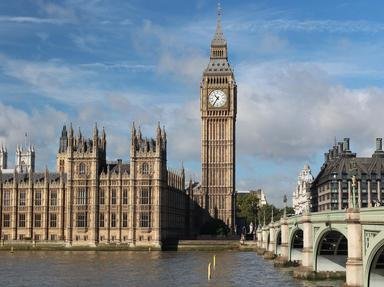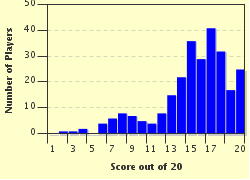Quiz Answer Key and Fun Facts
1. Winston's father, Lord Randolph Churchill, was British. What nationality was his mother, born Jeanette "Jennie" Jerome?
2. What military academy did Winston Churchill attend?
3. What was the first name of Winston Churchill's wife? (Hint: He was married to only one woman his entire life.)
4. What was the name of the country estate purchased by Churchill?
5. In what war was Churchill taken prisoner and then escaped? (Hint: The reward poster after his escape noted, "He does not speak a word of Dutch.")
6. What was Churchill's speech impediment? (Hint: He used to practice saying, "The Spanish ships I cannot see for they are not in sight.")
7. What was the name of the British Prime Minister WC replaced just after WWII started? (Hint: "Peace in our time.")
8. What was the name of the British warship on which Roosevelt and Churchill met near Canada in the early days of World War II? They hammered out details of the Atlantic Charter at this meeting.
9. Who, along with Churchill and Roosevelt, did the press refer to as the "Big Three" in WWII?
10. When Churchill said, "Never in the field of human conflict was so much owed by so many to so few", who did he mean by "so few"?
11. How many days after the Normandy D-Day landing on 6 June 1944, did Churchill visit the beach?
12. What was the breed of Churchill's dog Rufus? (Hint: Actress Elizabeth Taylor also owned this breed.)
13. What hobby did Churchill enjoy in his later years?
14. What did the initial "S" stand for in his name Winston S Churchill?
15. What did Winston Churchill mean by the expression "black dog"?
16. What did Churchill refer to as the "naughty document"?
17. Which of these important figures used the phrase "iron curtain" before Churchill did in his famous "Sinews of Peace" speech in Missouri (USA) in 1946?
18. In what field did Churchill win a Nobel Prize?
19. Who was the U.S. president when Churchill was named an Honorary Citizen of the United States by an act of Congress? (Hint: This president died before Churchill did.)
20. In this quote by Churchill, what is the missing word? "I am prepared to meet my Maker. Whether my Maker is prepared for the great ordeal of _____________ me is another matter."
Source: Author
root17
This quiz was reviewed by FunTrivia editor
stedman before going online.
Any errors found in FunTrivia content are routinely corrected through our feedback system.

